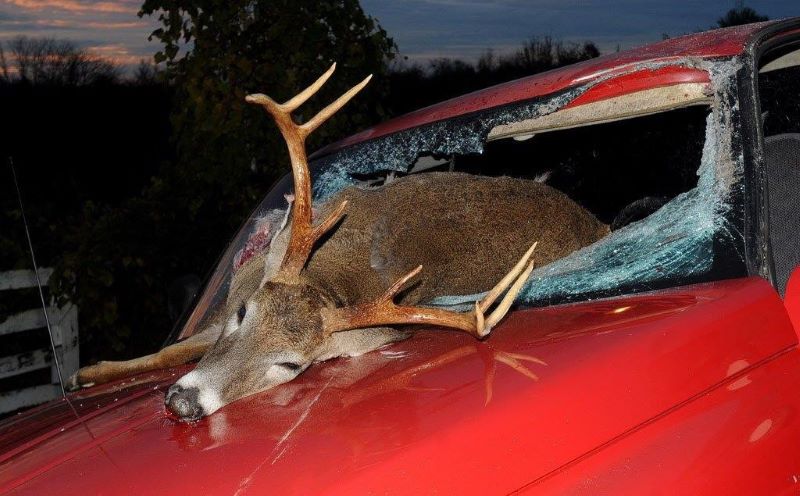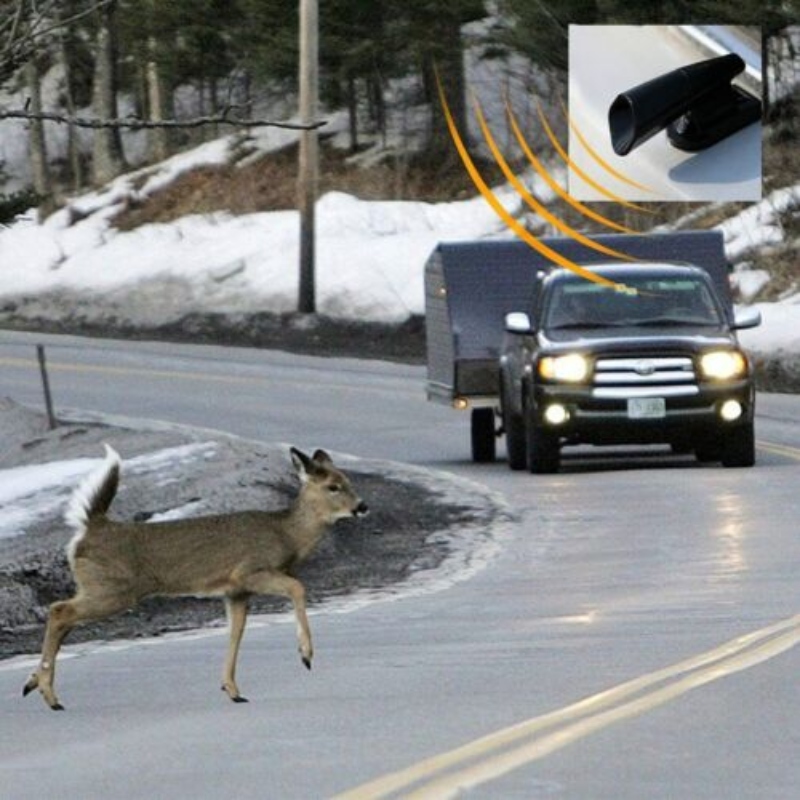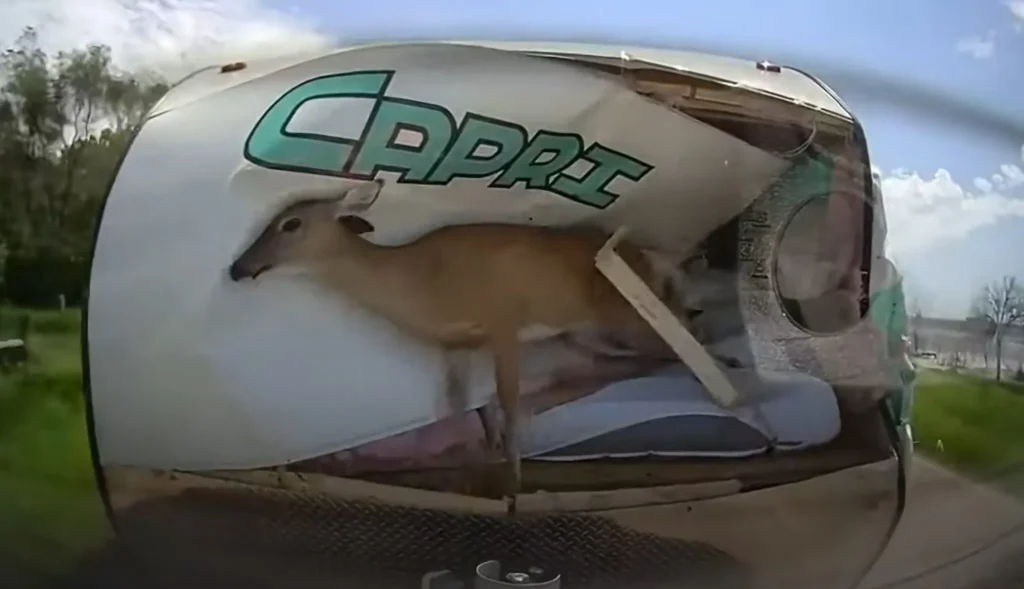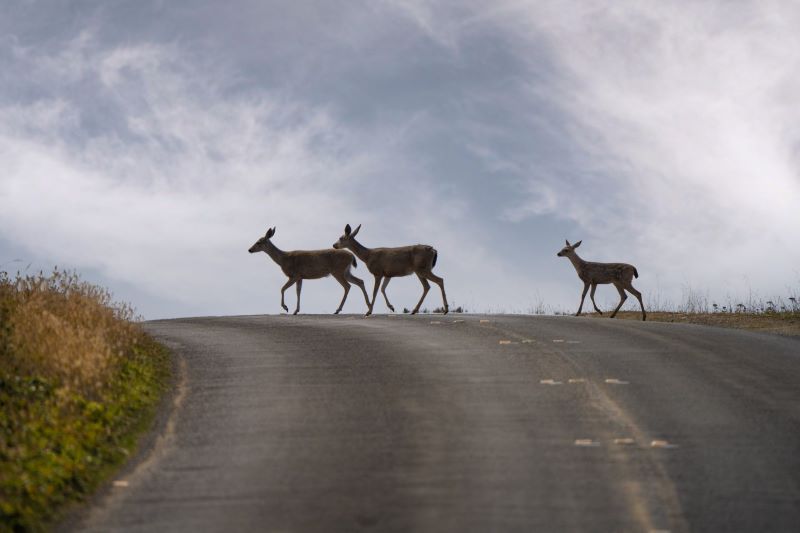Thanks for your support! If you make a purchase using our links in this article, we may make a commission. And, as an Amazon Associate, I earn from qualifying purchases. See the full disclosure here.
The question regarding adding a deer whistle on an RV is something worth considering when you travel. If you have ever hit a deer, you know the kind of damage they can do to your vehicle, whether it is a car or an RV.
My father-in-law had a well-antlered buck jump into the path of his truck camper and crashed into the window. Along with being frightened, my father-in-law had some minor injuries from the antlers coming through the window. The window was smashed, and the cab-over section was damaged. He was on a four-lane highway, not a country road.
I have also hit a deer with a Ford Explorer, which took out the front grill and the radiator underneath. Neither I nor my father-in-law had a deer warning whistle. Truly, in my own case, there was no time to even swerve the car or think about what to do. The question is whether a deer whistle on an RV or car would have worked to deter the deer.
Let’s take a closer look at deer whistles and what they can or cannot do.
How Do I Keep Deer Away From My RV While Driving?

There are several things you can do to try and avoid deer while driving, which include staying off heavily wooded roads. Practicing defensive driving while on these types of roads might be better than finding ways to keep deer away from your RV.
These wild animals are unpredictable, and when it is mating season, you really have to watch out. Here are a few things you can do if you are in an area with deer.
Before setting out, you can upgrade your headlights so you can see farther in the distance at night. LED headlights are a good option in place of traditional halogen bulbs.
If you are on a wooded road, there might be deer lurking in the trees. Slow down and be aware of your surroundings. Look for deer crossing signs, use your high beams when you can, and look for recently killed deer.
You can also safely assume that if you see one deer, there will be more to follow.
Of course, RVs require more stopping time and will sustain more damage if you hit a deer because of the fiberglass front.
How Do Deer Whistles Work?

Deer whistles are powered by air moving through the whistle when the device is placed on the hood of the car or RV. There are deer whistles that are paired with different sounds for bucks and female deer. You must drive around 30 mph for the deer whistle to work.
Where Do You Put Deer Whistles on A Car And RV?
The deer whistle is placed on the hood or grill of the car or RV. Placing the deer whistle on an RV anywhere else, like behind the bumper, won’t give the device the airflow it needs. In order for the device to work, it needs to be in front of your vehicle and out in the open.
Placing the deer whistle for RVs on the roof could put it in harm’s way. It could get knocked off or damaged from low clearances or tree branches.
Why Not Honk at Deer?
There are mixed opinions about whether to honk at a deer or not. Some say that periodically honking can help scare the deer that might be near the road. Honking too much may confuse the deer and cause them to come closer to the road. It can also confuse other drivers on the road.
If you see a deer in the road, honking may work to scare it back into the woods. However, when you scare the deer, fight-or-flight responses are not predictable, and you could bring the whole herd into your path.
As for my deer encounter, I had no time to react, let alone honk.
Do Deer Whistles on Cars and RVs Really Work?
Deer whistles emit an ultrasonic sound that is not heard by humans. But according to research, it doesn’t have a great effect on deer either.
The range of the sound produced by air-activated deer whistles is around 16-20 kHz at speeds at or above 30 mph. According to recent data, deer whistles were not found to deter traffic encounters with deer.
What Do Deer Hate the Most?

While the use of aromatic plants such as lavender, rosemary, oregano, thyme, catmint, garlic, and chives might keep deer out of your garden, there really is no one solution that will keep a deer from jumping out in front of your RV or car.
Research also shows that deer are discouraged from going near certain areas frequented by predators such as coyotes and bobcats. Urine from these animals can be an effective repellent.
How these scents that are hated by deer can be utilized with a vehicle or RV has not yet been studied.
What Do I Do if I Hit a Deer with My Car or RV

Despite all your preventative measures, you could still hit a deer. If you do, there are a few things you should remember. As with any accident, pull over to the side of the road, activate your hazard lights. Then set up your hazard triangles, and flairs on the roadside. This indicates to other drivers that they should slow down when they drive past the scene.
Make sure you and everyone in the car are safe. You should call the police, particularly if the deer is dead on the road. They will know how to remove the carcass and keep traffic slow while the road is cleared.
Of course, assess the damage to your RV and call your insurance company. Hopefully, the damage will be minor, and you can still drive to your destination. Take photos of the damage with your phone for the insurance company and your own records.
What’s The Best Deer Deterrent for Your Car And RV?
The best deer deterrent to keep your car and RV safe is to hone your defensive driving skills, particularly when on wooded roads where deer might be encountered.
Make sure you wear your seat belt. Also, stay in your lane. If you see a deer coming and do not try to swerve out of the way. Ending up in oncoming traffic will only make the problem worse. Apply your brakes evenly until you stop.
Make sure you watch for deer crossing signs and be alert at dusk and dawn when deer are more active and more likely to appear. Of course, drive at the posted speed limit or slow down a bit until you are out of the woods.
Encountering deer on the road is very likely in certain areas. My take on deer whistles is to do your research. Whether you decide to purchase one or not, still be ready to use your defensive driving skills, take your time, and keep your speed down. You are more likely to see the deer scamper off into the woods, rather than bounce off of your hood.
Related Reading:
1. Best Bug Repellents For Your RV Windshield
2. 15 RV Packing Tips for Beginners
3. Does Insurance Cover RV Windshield Replacement?
4. What Does RV Insurance Cover?
Terri Nighswonger – Author and Full Time RVer
Terri Nighswonger and her husband Todd have been RVing and work camping for six years with their Cavalier King Charles Spaniel, Newton, and their Minnie Australian Shepherd, Remi.
In Addition to the RVBlogger team, Terri has written for RV Life and RV Camping Magazine and is always excited to talk about her passion for RVing and her knowledge and experience in work camping.
Writing is Terri’s passion, but she also loves hiking, kayaking, walking her dogs, and anything she can do outdoors.
They originate from the Midwest but plan to enjoy the West for a few years, wintering in Arizona and summering wherever the road may lead.



put in the brightest amber fog lights u can get. Has worked for over 20 years in deer valley MT.
Had 3 encounters before I put on my car, now on my M/H we watch them look at us when we drive by them.
The deer whistles worked kind of when I was a kid on my Dad’s car but not really! It’s not just forested areas that have a lot of deer….farmlands seem to be worse.
You have a lot of great suggestions and I think everyone will do well to follow all of them. From my experience with and without deer whistlers, before my wife and I started using deer whistlers on our cars, trucks, and our RV, I hit my first deer. It was about dusk, and I didn’t have time to react. The speed limit was 55 and that was what I had my cruise set to. I was lucky it only damaged the bumper. The deer was propelled about 150 feet and off to the side of the road. My wife had hit several deer before we looked into putting deer whistlers on all of our vehicles along with changing our driving habits we haven’t hit a single deer to date. I thought I would mention that the first deer I hit there were no trees or forest near the road, so there doesn’t have to be trees near the road for someone to have a deer encounter. I’d suggest following every thing you’ve suggested along with installing deer whistlers. Deer whistlers come in pairs and it does matter where they are located on your vehicle. They are side specific. Read the instructions for installation of your deer whistlers. I could go on but no more time. I hope this helps!
NO Deer Whistles do NOT work, one of the biggest scams for people that drive. Pay attention to the sides of the roads and watch for their eyes to light up .
Dawn, dusk. Those are the times to be most vigilant. I’ve found whistles to be nothing but a false sense of security vs. just being VERY watchful of those areas along the road (wooded and rural areas at the edge of towns due to available food sources nearby). I’ve never hit a deer but boy have they hit me!! Rammed in the side, over the hood, switchback hits, you name it in my 35 years of driving. The biggest issue is disorientation/ panic for the deer. Brighter headlights don’t mean you’re safe, it can blind and confuse animals to freeze or worse escape the monster. Slow down, keep a good eye out and I wish we could get a product with IR dashcams to detect their movement off the side when driving in low light situations. Call it the BuckDucker3000 or DoeDodger3000.